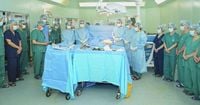A tragic work accident has led to a remarkable act of generosity in Vietnam, as the family of a deceased man has agreed to donate his organs, saving the lives of multiple patients. This heartwarming story unfolded at Bach Mai Hospital in Hanoi, where doctors worked tirelessly to save the man, but unfortunately, he could not be saved.
On May 9, the man's wife shared a poignant reflection on their discussions regarding organ donation. "If one day I leave, if my body can help others, please let my family arrange it, fulfill my wish," she said, adding that her husband supported this idea, believing that 'giving is forever.' Tragically, it was her husband who passed away, but his spirit of giving lives on through the lives he has touched.
After the family's agreement to proceed with organ donation, the medical team at Bach Mai Hospital began the retrieval process. Doctors paid tribute to the donor before the surgery commenced, demonstrating their respect and gratitude for his decision. The organ retrieval surgery lasted nearly two hours, culminating in the successful extraction of vital organs: the heart, liver, two kidneys, and two corneas.
Once the organs were retrieved, they were quickly processed and prepared for transport. The heart was rushed to the airport to ensure timely delivery to Hue Central Hospital, where a young female patient awaited a transplant. This patient had been suffering from dilated cardiomyopathy for several years, and her situation was critical.
Doctors at Hue Central Hospital explained that the young woman had blood type AB and HLA antibodies, which made finding a compatible donor exceedingly difficult. She had previously been scheduled for four heart transplants, all of which had failed due to positive cross-matching. This fifth attempt was her last chance at life, and fortunately, the heart was successfully transplanted, beginning to beat again just 15 minutes after the procedure.
Meanwhile, the liver was sent to Viet Duc Hospital in Hanoi, where a five-hour transplant surgery was performed. The procedure went smoothly without the need for blood transfusions, and the liver began functioning well post-transplant. Remarkably, the patient was awake and breathing on her own by the next morning.
The two kidneys retrieved from the donor were simultaneously transplanted into two patients at Bach Mai Hospital. Both recipients had been on dialysis for years—one was a female patient suffering from lupus nephritis, and the other a male patient with chronic glomerulonephritis. After the transplant, both patients showed stable surgical parameters, and their new kidneys began to produce urine immediately.
Interestingly, the two kidney recipients were situated right next to the donor's room, separated by just a wall. They did not know each other or who their donor was, but both have been given a new lease on life thanks to a shared part of their existence. Dr. Dao Xuan Co, Director of Bach Mai Hospital, remarked, "They do not know each other, do not know who the donor is, but now they have been reborn with a new life from a shared part of life."
Additionally, the two corneas retrieved from the donor were sent to the Eye Banks of the Central Eye Hospital and Hanoi Eye Hospital. These corneas are now ready to restore sight to patients in need of ophthalmic surgeries.
As the organ donation process came to a close, the medical team completed the necessary formalities and prepared to return the donor's body to his family. As the ambulance departed, the doctors bowed their heads in a final farewell, honoring the man who had given so much.
Organ transplantation in Vietnam began in 1992, initially with living donors. The practice of organ transplantation from brain-dead donors was introduced in 2010. Over the past 33 years, Vietnam has conducted more than 9,500 organ transplants, becoming a leader in Southeast Asia. In recent years, the country has averaged over 1,000 transplants annually, highlighting a significant increase in public awareness and acceptance of organ donation.
In 2024, there were 41 cases of organ donation from brain-dead individuals, a substantial increase from previous years. The first two months of 2025 have already seen 21 cases of organ donation after brain death, reflecting a growing trend in the community's willingness to participate in this life-saving practice.
Looking ahead, the Ministry of Health plans to collaborate with various agencies to draft amendments to the Law on Donation, which includes significant updates to the regulations surrounding organ and tissue donation. These changes aim to further enhance the organ donation framework in Vietnam, ensuring that more lives can be saved in the future.
This remarkable story of organ donation not only highlights the compassion of one family but also serves as a testament to the growing acceptance of organ donation in Vietnam. It reminds us of the profound impact that one person's decision can have on the lives of many, transforming tragedy into hope and renewal.




